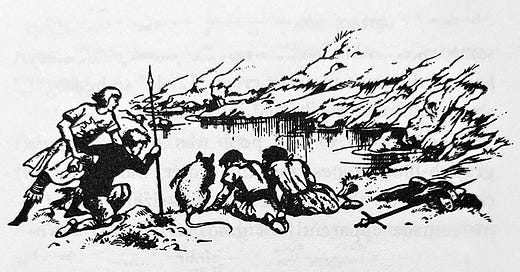The Voyage of the Dawn Treader: Chapter 8 “Two Narrow Escapes”
C.S. Lewis Read-Along, Vol. 3, Issue 9
Chapter 8 “Two Narrow Escapes”
Background: Greed, as with most other sins, can easily mix with pride and become all the more spiritually deadly. The only solution is to look up and beyond ourselves to the One who outshines our pride.
Foreground: It would be easy to dismiss so many coincidences in the events of this chapter and all of The Voyage of the Dawn Treader, but in reality, Aslan “seems to be at the back of all the stories.” C.S. Lewis trusted that God was at the back of his story as well.
Quote: “Across the gray hillside above them—gray for the heather was not yet in bloom—without noise, and without looking at them, and shining as if he were in bright sunlight though the sun had in fact gone in, passed with slow pace the hugest lion that human eyes had ever seen.”
Join with others to gain full access to the Lewis read-along (including this one), the latest news on Lewis, Tolkien, and adaptations of their works, and the full archives, including The Lion, the Witch and the Wardrobe and Prince Caspian read-alongs.
Background: “Two Narrow Escapes”
Previously, Eustace becomes a dragon after sleeping on treasure with greedy thoughts. Now, greed establishes itself even more as a theme of The Voyage of the Dawn Treader. The two narrow escapes referenced in the chapter title both relate to greed.
First, we see the stupid greed of the Sea Serpent. It merely wants to eat what is on the ship but fails to make sure it has actually secured its meal. The Dawn Treader escapes because of the inspiring if ineffective bravery of Eustace and the quick thinking of Reepicheep. But also because the sea serpent is greedily scrounging through the wreckage it pulls off the ship and never pursues them.
But Lewis’ exploration of greed in this chapter is not limited to a base desire for more stuff. In “Two Narrow Escapes,” we also see greed for increased standing, a greed mixed with pride. C.S. Lewis knew this prideful lust for superiority because it flowed from his adolescence.
Lewis endured abuse in the British private school system. This led him to adopt an effective but destructive means to cope, as Harry Lee Poe writes in Becoming C.S. Lewis:
“Jack’s struggle with how he felt about himself under the onslaught of ridicule and humiliation would develop into a character of arrogance and pride—a sin that would dog him the rest of his life and about which he would write in Mere Christianity and Surprised by Joy. Before his conversion, he masked a bruised spirit with an outward veneer of pompous superiority to others.”
Even later in life, Lewis wrote a letter in which he referred to pride as “a perpetual nagging temptation.”
Note in Dawn Treader how Caspian and Edmund respond to the discovery that one of the streams turns whatever it touches into gold. The desire is not necessarily for riches but for more riches and more status. Caspian says, “The king who owns this island would soon be the richest of all kings of the world.” And he says they all must keep it a secret “on pain of death.” Edmund responds, “I’m not subject of yours. If anything, it’s the other way round.”
Keep reading with a 7-day free trial
Subscribe to The Wardrobe Door to keep reading this post and get 7 days of free access to the full post archives.





